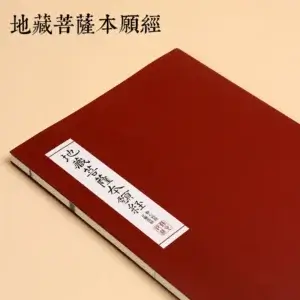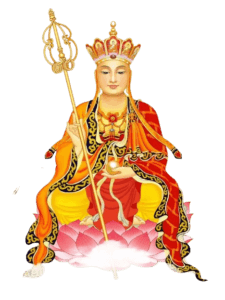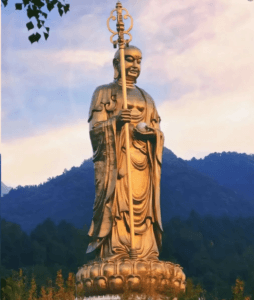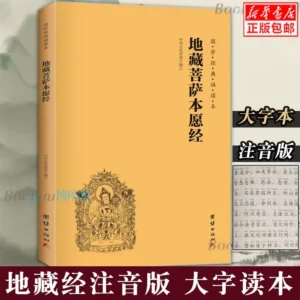The Sutra of the Original Vow of Ksitigarbha Bodhisattva, or the Sutra of the Original Vow of Ksitigarbha Bodhisattva for short, is one of the most important and widely circulated classics in Chinese Buddhism.
The Sutra of the Original Vow of Ksitigarbha Bodhisattva elaborates on the consequences of evil deeds, the description of Buddhist hells, and the benefits of good deeds, both large and small, and has a profound impact on the practice and life of Buddhist believers.
The full name of the”Earth Store Bodhisattva Sutra”is”The Sutra of the Merits and Vows of Earth Store Bodhisattva,”translated by the eminent Tang Dynasty monk Tripitaka Master Shikshananda.This scripture mainly narrates the vows,deeds,and methods of saving sentient beings of Earth Store Bodhisattva.

It is divided into three major sections, namely the upper, middle, and lower sections, with a total of thirteen volumes. In the text, Sakyamuni Buddha preached to his mother, Lady Maya, in the Trayastrimsa Heaven Palace, and introduced in detail the great vow of Ksitigarbha Bodhisattva – “I will not become a Buddha until hell is empty; I will not attain Bodhi until all sentient beings are saved.”
The great vows made by Ksitigarbha Bodhisattva in his past lives to save his mother and sentient beings show the great compassion and deep mercy of Ksitigarbha Bodhisattva.
Table of Contents
ToggleKsitigarbha Bodhisattva’s original vow and deeds

Ksitigarbha Bodhisattva’s original vow is one of the core contents of this classic. Ksitigarbha Bodhisattva has appeared many times in the past lives, such as Brahman Girl and Guangmu Girl. In order to save his mother who fell into the evil way, he spared no effort to do good deeds. In the end, with his great vows and practice, he helped his mother escape from the sea of suffering.
1.The Brahmin Girl Saves Her Mother
In a past era, a Brahmin girl’s mother held misguided beliefs, disparaging the Three Jewels (Buddha, Dharma, Sangha). After her death, she fell into the Avici Hell. The daughter, heartbroken, sold her possessions to buy incense and flowers for offerings at a temple enshrining the Buddha “Lion’s Roar of Ten Thousand Practices.” She wept before the Buddha’s image, praying to know her mother’s fate. Moved by her filial devotion, the Buddha manifested and guided her to meditate on his name. Through intense concentration, she witnessed her mother suffering in a hellish realm of boiling seas and iron-beast torment. By the Buddha’s power and her unwavering faith, her mother was liberated from hell and reborn in a heavenly realm. The daughter then vowed: “Until all beings are freed from suffering, I shall not attain Buddhahood.” This Brahmin girl was a past incarnation of Kṣitigarbha Bodhisattva.
2.Guangmu Girl’s Quest for Her Mother
Another incarnation saw Kṣitigarbha as “Guangmu,” whose mother died after slandering the Three Jewels and killing aquatic creatures. Guangmu sought a holy monk’s help, who meditated and saw her mother in hell. He advised Guangmu to sculpt an image of “Pure Lotus Eyes Buddha” and devoutly pray. One night, the Buddha appeared in her dream, revealing her mother would be reborn as her servant’s child. The newborn spoke at three days old, confessing: “I am your mother! My sins brought me to hell, but your merits saved me.” The child further warned of her short lifespan due to past karma. Guangmu wept and vowed: “I will rescue all suffering beings across infinite kalpas!” Her mother later attained liberation, and Guangmu’s vow became the foundation of Kṣitigarbha’s mission.
These stories not only show Ksitigarbha Bodhisattva’s filial piety to his mother, but also reflect his compassion and salvation for all sentient beings. Ksitigarbha Bodhisattva’s original vow has become one of the most representative vows in Buddhism, inspiring countless believers to practice.
The state of hell and cause and effect
The description of hell in the “Ksitigarbha Sutra” is extremely detailed and vivid. The sutra depicts various terrifying scenes and cruel punishments in hell, such as mountains of knives and seas of fire, molten copper and iron juice, etc., so that sentient beings can intuitively understand the serious consequences of evil karma.
If sentient beings commit the ten evil deeds and other bad deeds, they will fall into different hells and suffer according to their karma after death.
1. Mountain of Blades
Sinners climb mountains studded with razor-sharp blades. With each step, their flesh is sliced apart, limbs severed. Iron beasts—snakes and dogs with fiery fangs—chase them, tearing their bodies.
2. Sea of Fire
A boiling ocean of molten copper engulfs sinners. Flames surge skyward as they sink, their skin blistering and bones charring. Demonic birds dive to peck their eyes while scorching winds scorch their lungs.
3. Iron Beasts
Iron snakes coil around sinners’ necks, strangling them as venom burns their throats. Iron dogs with blazing eyes gnaw at their entrails, dragging them through fields of burning embers.
4. Flying Blades & Fire-Arrows
Knives whirl through the air, impaling bodies mid-air. Arrows tipped with fire pierce hearts, pinning sinners to molten ground as their screams echo in the smoky void.
Cause and effect
These torments arise from earthly sins: murder breeds blade mountains; arson ignites fire seas; cruelty summons iron beasts. Karma’s law is precise—every agony mirrors one’s own deeds.
The sutra does not simply emphasize terror. It uses various specific examples to illustrate that no matter how serious the sins are, as long as sentient beings can sincerely repent and reform themselves during their lifetime, they still have the opportunity to reduce or avoid the suffering of hell.
This explanation of cause and effect not only warns people to avoid committing evil deeds, but also gives people hope to reform themselves.

Benefits of sentient beings for life and death
The Ksitigarbha Sutra also elaborates on the importance and methods of doing good deeds for the deceased.
For the deceased
During the 49 days of the 77th month, doing good deeds for the deceased, reciting this sutra, offering to the Three Jewels, etc., can help the deceased reduce their sins and gain liberation. For the living, they can also receive infinite blessings and protection.
Benefits of Offering
The sutra also mentions the various protections and benefits that Ksitigarbha Bodhisattva provides to sentient beings who pay homage to and offer him offerings, including increasing blessings and longevity, eliminating karma, and fulfilling wishes. These contents not only provide believers with specific methods of practice, but also allow them to feel the compassion and blessing of Ksitigarbha Bodhisattva.

-
Protection by Divine Beings
- Recite the sacred name of Kṣitigarbha Bodhisattva—“Namo Kṣitigarbha Bodhisattva”—1,000 times every day without interruption for 1,000 consecutive days, and you will receive the lifelong protection of the Dharma-protecting deities. Celestial dragons and virtuous spirits will guard the practitioner day and night.
-
Accumulation of Virtue
- Good karma multiplies daily, leading to favorable rebirths.
-
Foundation for Enlightenment
- Creates causes to attain Buddhahood, ensuring no regression on the path.
-
Material Abundance
- Clothing and food will be plentiful without scarcity.
-
Immunity to Epidemics
- Protected from plagues and contagious diseases.
-
Avoidance of Disasters
- Free from floods, fires, and natural calamities.
-
Safety from Theft & Violence
- No harm from robbers or weapons.
-
Respect from Others
- Gain admiration and trust from people.
-
Assistance from Spirits
- Ghosts and deities secretly aid the practitioner.
-
Favorable Rebirth
- Women may transform into male bodies (if desired), attaining noble status.
-
Beauty & Dignity
- Reborn with majestic appearance and auspicious signs.
-
Rebirth in Heaven
- May ascend to heavenly realms after death.
-
Royal or Noble Status
- Future lives as kings, ministers, or aristocrats.
-
Clairvoyance of Past Lives
- Remember previous incarnations clearly.
-
Fulfillment of Wishes
- All virtuous aspirations will be accomplished.
-
Harmonious Family
- Family members live in joy and unity.
-
Elimination of Misfortune
- Unexpected tragedies and obstacles vanish.
-
Karmic Obstacles Removed
- Heavy negative karma from past lives dissolves.
-
Smooth Life Journey
- All endeavors proceed without hindrance.
-
Peaceful Dreams
- No nightmares; sleep filled with auspicious signs.
-
Liberation of Deceased Relatives
- Deceased ancestors escape suffering and attain bliss.
-
Rebirth with Blessings
- Future lives inherit past merits, born into fortunate circumstances.
-
Praise from Saints
- Buddhas and bodhisattvas rejoice in the practitioner’s virtues.
-
Sharp Wisdom
- Develop keen intellect and retentive memory.
-
Compassionate Heart
- Natural cultivation of boundless compassion.
-
Ultimate Buddhahood
- Ultimately attain perfect enlightenment.

Praise of Buddhas and Bodhisattvas
In the Ksitigarbha Sutra, many Buddhas and Bodhisattvas praised the merits and vows of Ksitigarbha Bodhisattva. When Sakyamuni Buddha preached to his mother in the Trayastrimsa Heaven Palace, he specifically entrusted Ksitigarbha Bodhisattva to take on the responsibility of saving sentient beings in the Saha world in the Dharma Ending Age after the Buddha’s extinction.
This entrustment is not only a trust in Ksitigarbha Bodhisattva, but also an encouragement to all believers, giving them a clearer direction and support on the path of practice.
With its rich content and profound teachings, the Ksitigarbha Sutra has become one of the important classics for Buddhist believers to practice. It emphasizes the importance of cause and effect, compassionate salvation, and self-help of sentient beings, and guides us to change our destiny and gain liberation through practice and accumulation of good deeds.
This classic not only holds an important position within Buddhism, but also has a profound impact on the world, becoming an important link between Buddhism and folk beliefs. If you need this Ksitigarbha Sutra, you can get it for free.

